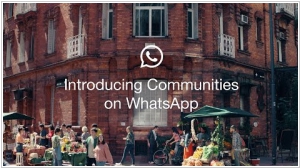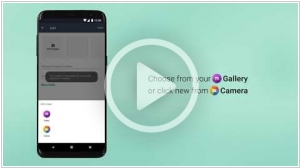Kik vs WhatsApp
June 04, 2023 | Author: Adam Levine
27

WhatsApp Messenger is a cross-platform mobile messaging app which allows you to exchange messages without having to pay for SMS. WhatsApp Messenger is available for iPhone, BlackBerry, Android, Windows Phone and Nokia and yes, those phones can all message each other! Because WhatsApp Messenger uses the same internet data plan that you use for email and web browsing, there is no cost to message and stay in touch with your friends.
Kik and WhatsApp are both messaging apps that allow users to communicate with friends and family, but they differ in terms of their features and user base. Kik, known for its anonymity and pseudonymous usernames, offers features such as chat, media sharing, group chats, and built-in web browsing. It appeals to a younger demographic and emphasizes social interaction and discovery through features like public groups and bot integration. On the other hand, WhatsApp focuses on providing a secure and reliable messaging experience with end-to-end encryption. It offers features like messaging, voice and video calls, file sharing, and group chats. WhatsApp has a larger global user base and is commonly used for personal and business communication.
See also: Top 10 Business Messaging platforms
See also: Top 10 Business Messaging platforms
Kik vs WhatsApp in our news:
2023. WhatsApp launches its native macOS app
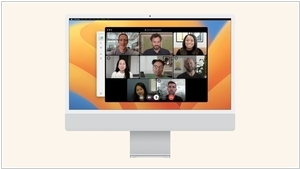
WhatsApp has introduced a new native Mac app, enabling users to engage in video calls with a maximum of eight participants and audio calls with up to 32 individuals. The redesigned app is tailored to Mac users, facilitating increased productivity on larger screens. Notably, users can seamlessly share files through drag-and-drop functionality in chats and access a more extensive chat history. After a period of testing, WhatsApp released the app in public beta earlier this year, making it available to users with Apple Silicon systems and macOS 11 Big Sur or later.
2023. WhatsApp introduces a new Windows client with better calling features

WhatsApp has unveiled an upgraded Windows client that boasts enhanced calling features and improved performance. With the latest version, users can stay connected even when their phone is inactive, thanks to multi-device synchronization. The desktop app now also enables group video calls for up to eight people and audio calls for up to 32 participants, on par with the mobile application. Furthermore, WhatsApp plans to expand the number of people allowed in a group call. In light of its multi-device linking capability that allows one account to be used across various devices, the company has been focused on enhancing its desktop experience.
2022. WhatsApp's new Communities tool sounds a lot like Slack
WhatsApp has introduced a new feature called "Communities," which enables users to create groups within the app for specific organizations or groups, such as schools or apartment buildings. These communities will have sub-groups where members can discuss specific topics, and administrators will have the ability to send announcements to all members. The concept of communities on WhatsApp bears resemblance to Slack, a popular messaging platform in the digital workplace. Along with the introduction of communities, WhatsApp is implementing some additional changes to its Groups feature that also resemble Slack's functionality. Notably, users will now be able to express themselves through emoji reactions, and audio calls will accommodate up to 32 participants. The file sharing size limit has been increased to 2 GB, and group administrators have the ability to delete messages. These updates bring enhanced functionality and versatility to the WhatsApp platform.
2021. WhatsApp brings its Business API to the cloud to speed adoption
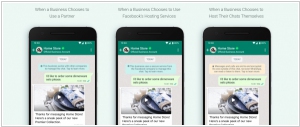
WhatsApp is introducing a new version of its WhatsApp Business API, which will now be hosted on Facebook's infrastructure in the cloud. According to the company, this shift will significantly reduce the integration setup time from weeks to just minutes. As a result, businesses can swiftly transition to WhatsApp's API platform and effectively communicate with their opted-in customers. Over the past few years, WhatsApp has been expanding its Business API to create a significant revenue stream from its otherwise free messaging service. Presently, businesses pay WhatsApp on a per-message basis, with rates varying depending on the number of messages sent and the region. Currently, numerous large enterprises, including Vodafone, Coppel, Sears Mexico, BMW, KLM Royal Dutch Airlines, Iberia Airlines, Itau Brazil, iFood, and Bank Mandiri, have already adopted the existing API (non-cloud based) to enhance their operations.
2021. WhatsApp adds voice and video calling to desktop app

Support for voice and video calling is being introduced to the desktop app of WhatsApp for Mac and Windows. Initially, this feature will only be available for one-to-one calls, but the company plans to expand it to include group voice and video calls in the future. The video calls are designed to work seamlessly in both portrait and landscape orientation. Additionally, the desktop client will always remain on top of other windows, ensuring that video chats are never lost amidst a browser tab or a stack of open windows. WhatsApp conducted tests for this feature with a small group of desktop users last year.
2020. WhatsApp finally launches payments
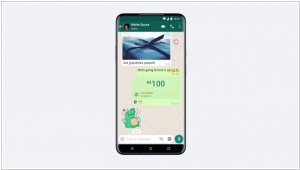
WhatsApp has made an announcement that users in Brazil will have the privilege of being the first to send and receive money through its messaging app. This will be made possible by utilizing Facebook Pay, the payments service launched by WhatsApp's parent company, Facebook, last year. The payments service is currently free for consumers, meaning there are no commission fees involved. However, businesses will be required to pay a 3.99% processing fee to receive payments. To complete transactions, users will need to enter a six-digit PIN or use their fingerprint. To use the service, you need to connect your WhatsApp account with your Visa or Mastercard credit or debit card. Initial local partners for this service include Banco do Brasil, Nubank, and Sicredi. Additionally, Cielo, a payments processor, is collaborating with WhatsApp to facilitate transactions. The company stated, "We have created an open model to allow for the inclusion of more partners in the future."
2019. WhatsApp adds business catalogs
WhatsApp is enhancing its business app by introducing a new feature called "catalogs." This feature enables businesses to present and share their products and services with potential customers. Interested customers can explore product photos, view prices, and read descriptions to make informed purchase decisions. These catalogs function as convenient mobile storefronts on WhatsApp, eliminating the need for a dedicated web page. Business owners can effortlessly create catalogs by accessing the Catalog option in the app's settings, uploading product photos, and providing relevant details, including optional product or service codes.
2019. WhatsApp Business app added customer service features to its desktop and web apps
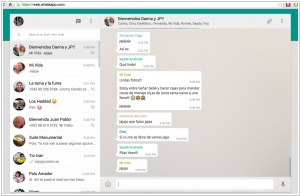
About a year ago, WhatsApp launched its dedicated app tailored for small businesses. Now, the company is enhancing the usability of the app on desktop and web platforms by incorporating several popular features that were previously exclusive to mobile devices. These additions encompass tools for organizing and filtering chats, as well as facilitating prompt responses to customer inquiries. One such feature is Quick Replies, which enables businesses to swiftly address common customer questions using pre-written responses. It joins a suite of other customer service features, including automated greeting messages triggered when a customer contacts the business account, and scheduled away messages for instances when immediate responses are not feasible.
2018. WhatsApp launched encrypted group video calls
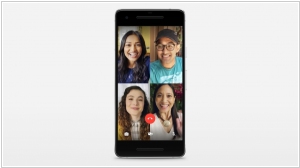
WhatsApp introduced video calling in 2016, initially limited to two participants. However, in a recent update, the app has expanded its video calling support to accommodate a total of four participants. While this increase may appear modest when compared to other services, such as Facebook Messenger allowing up to 50 participants or Skype supporting 25 participants, it presents unique challenges for WhatsApp. The app prioritizes end-to-end encryption for all messages, including video calls, by default. Additionally, WhatsApp must ensure that new features are optimized for users with slower internet connections and older devices. Balancing these factors while maintaining the app's security and performance is crucial for WhatsApp's video calling capabilities.
2018. WhatsApp adds Telegram-like channels
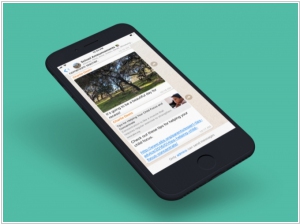
WhatsApp has introduced a new feature that allows group chat administrators to restrict message sending privileges to only admins. This addition proves beneficial for individuals and organizations utilizing WhatsApp as a platform for disseminating mass updates, while simultaneously reducing unnecessary noise and clutter. This functionality serves as an alternative to Telegram's channels, where only administrators possess the ability to broadcast messages. Such a format proves ideal for corporate micro-blogs seeking to deliver company news, discount offers, or announcements to a significant number of customers.



